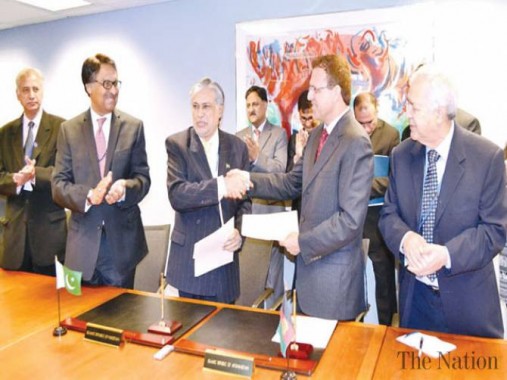
WASHINGTON – Pakistan and Afghanistan Saturday signed a key agreement over transit pricing for the Central Asia South Asia electricity transmission project (CASA-1000), which will help ease energy shortages in Pakistan.
When completed, the project, which is backed by the United States and the World Bank, will enable the Kyrgyz Republic and Tajikistan to sell excess summer hydropower to fill supply gaps in Pakistan and Afghanistan. CASA-1000 forms an essential element of a regional energy market that connects suppliers with customers as a means to promote economic growth.
The transit price agreement represents a critical, final step towards completion of a power purchase agreement.
“It’s a win-win for both countries,” Finance Minister Ishaq Dar said, as Pakistan concluded the negotiations with Afghanistan on reaching an accord on 1.25 cent per KW transit fee for supply of Central Asian electricity to Pakistan through the Afghan territory.
World Bank President Jim Yong Kim and US Special Representative for Afghanistan and Pakistan Dan Feldman witnessed the signing ceremony at the World Bank Headquarters.
The accord, welcomed by the WB President Kim and United States State Department, will help to establish the commercial arrangements for 1,300 megawatts (WM) of sustainable, regional electricity trade between Kyrgyz Republic, Tajikstan, Afghanistan and Pakistan.
“The United States will continue to engage with the four CASA-1000 countries and our international partners to advance this project not only to link suppliers of clean, green hydropower with customers, but also to sustain our long-term commitment to stability, security and prosperity for Afghanistan, its neighbours and the broader region,” State Department Spokesperson Jen Psaki said in a statement.
Finance Minister Dar described it a major step towards closer partnership between Afghanistan and Pakistan. He expressed appreciation for the World Bank, the US State Department and USAID for their support for the landmark project.
“This marks a new beginning towards greater economic cooperation between the two countries – and Pakistan is committed to greater economic and trade cooperation with Afghanistan,” which has a new government in Kabul,” Dar said.
For his part, Afghan Finance Minister Omar Zakhilwal said Afghanistan was ready to realize the CASA-1000 vision and improve energy security and trade for the two countries and the region.
CASA-1000 will build more than 1,2000 km of electricity transmission lines and associated substations to transmit hydropower energy from existing power generation stations in Tajikstan and the Kyrgz Republic to Pakistan and Afghanistan.
To oversee the complex, four-countries process, an inter-governmental council has been established that will supervise the design and implementation of the project.
In March 2014, the World Bank Group approved financing for the engineering design, construction, and commissioning of transmission lines and three new converter stations. The project would build upon existing power generation stations that will provide the energy to be traded over CASA-1000.
The commercial and operating framework for CASA-1000 is specifically based on “open access” principles that will allow additional energy supplying countries to connect with wider regional transmission networks.
CASA-1000 will enable the development of the Central Asia South Asia Regional Electricity Market (CASAREM) – a long-term plan for regional energy trade.
MACROECONOMIC INDICATORS REFLECT SOLID RECOVERY: DAR
Agencies add: Finance Minister Senator Mohammad Ishaq Dar met with Ms Sarah Bloom Raskin, Deputy Secretary of Treasury Department, on Friday.
The Finance Minister informed her that owing to fiscal discipline and focused approach of the government for economic revival of the country all macroeconomic indicators reflect solid recovery. He especially highlighted the reduction in fiscal deficit, buildup of foreign exchange reserves, increase in GDP growth and 16 percent increase in revenues.
The finance minister stated that the stock market had slowed down for a short while due to political disturbance but it rebounded well and was firmly entrenched at 30,000 level.
Ms Raskin appreciated the performance of the government despite odds and observed that continuity of such policies will certainly deliver dividends improving the life of common people in Pakistan. She expressed confidence that Pakistan will meet the targets for the forthcoming IMF review and will remain on track for the IMF program.
Dar also met Mr David Cohen, Under Secretary of the US Treasury Department. Mr Cohen appreciated that the government of Pakistan had enacted amendments in Anti-Terrorism Act which would enable the government to take actions against those indulging in financing terrorists.
The finance minister stated that the government was committed to stop terrorist financing as it was in its own interest.
Ishaq Dar in his meeting with Michael Froman, US Trade Representative, recalled the successful Trade and Investment Framework Agreement (TIFA) discussion held earlier in May this year. Dar said that US-Pakistan Trade and Investment Framework Agreement (TIFA) is the key vehicle for promoting US investments in Pakistan. He said government of Pakistan looks forward to working with USTR on the implementation strategy for the joint action plan.
The minister said that the cardinal principle of the current government was to promote trade rather than aid and to that effect to hope to work with the US towards enhanced market access opportunities for Pakistan.
The finance minister expressed his desire for an early renewal of US GSP Programme. He thanked the USTR office and the US Department of Agriculture/APHIS for extending Pakistan additional irradiation facilities at Houston and Mississippi, thereby permitting entry of Pakistani mangoes and other agricultural products into the US market. He appreciated the US interest in the early conclusion of BIT. He informed that the government of Pakistan is forming an inter-agency team to review the new BIT text with the US government and look forward to its early conclusion.
Froman said that the USTR office would work with Pakistan in the implementation strategy of the joint action plan. He proposed to organise a business week in Pakistan at the time of next business opportunities conference encompassing aspects of the joint action plan.





